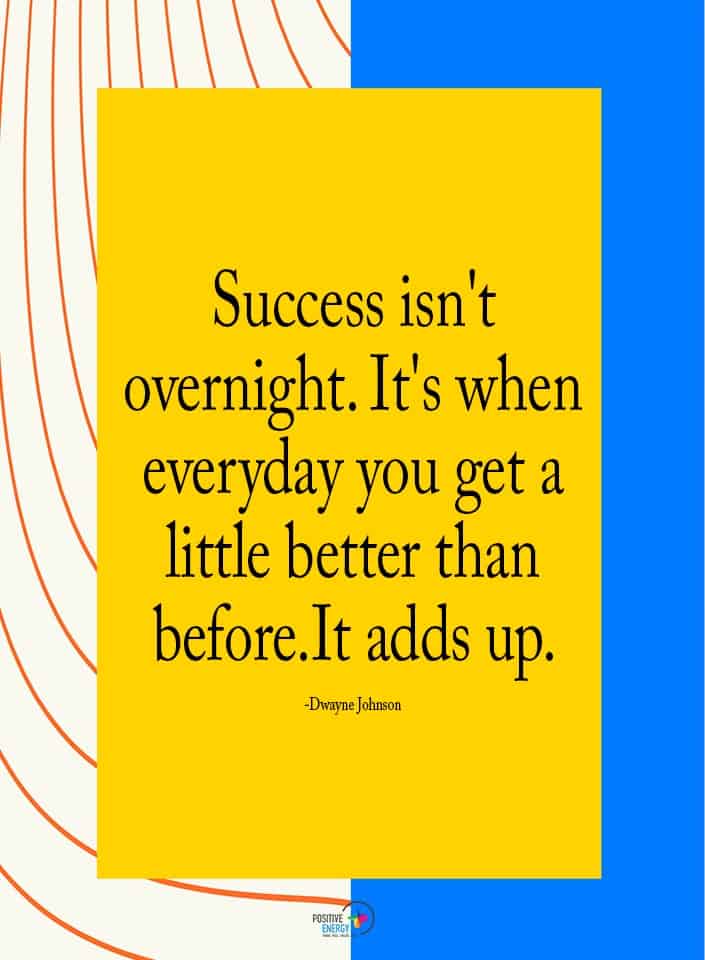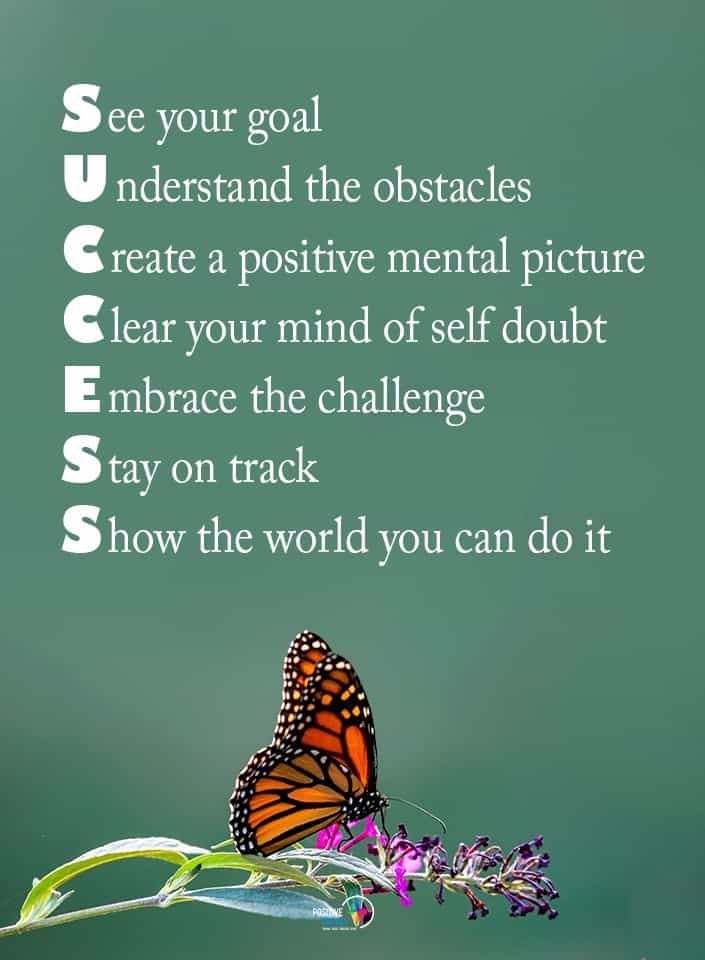It’s tough to be disciplined! A lot of the discipline you may have had as a child probably came from the enforces of that discipline. For example, you obeyed rules to avoid getting scolded by parents and kept working on certain skills to appease your teachers.
Now that you’re an adult, you’re even more responsible for your own actions than before. No one’s around to tell you what to do, save for your boss, and that can make it harder to stick to a complex plan or a difficult journey.
Without the right tools, your lack of personal discipline can wind up derailing your desire for success. How can you improve your ability to stay on task and hold yourself accountable for reaching your ambitions? Here are 9 ways to harness discipline to achieve your goals.
1. Stay Aware Of Your Purpose
Positive thinking alone isn’t enough. You’ll also have to keep your eyes on the prize – the second you lose sight of your goal, you’ll have lost your way as well.
Here are a few tips you can use to make sure you don’t lose track of your ultimate goal:
- Ensure you have a clear understanding of your objectives and intentions
- Track your progress on a daily, weekly, or monthly basis
- Use tools like your phone or a journal to keep on track
- Tailor each day so that its priorities move you closer to your final goal
- Consistently and persistently monitor and analyze your progress
- Have checkpoints and routines to ensure you stay on track
2. Be Aware Of Your Weaknesses
If you find yourself struggling at any point, the solution isn’t to work harder – it’s to play smarter. Here are a few ways to go about it.
· Acknowledge Your Struggles
Trying to dismiss them under the carpet of “I just need to work harder” will get you nowhere. Without really seeing what your roadblocks actually are, you won’t be able to create a proper game plan and address them accordingly.
· Know Thyself
Self-awareness is the most important tool anyone can have in their arsenal. Developing self-awareness lets you better regulate and control your emotions and thoughts – crucial factors when dealing with something that will test your discipline.
· Ask For Input
Cut to the chase and save yourself some effort by asking friends and family to highlight something about you that you can improve on. It’s important to be vulnerable and open – it can be really discouraging and hurtful to hear these things about yourself, but listening to what your loved ones have to say about you can be the eye-opener you had always needed.
· Delegate Task
Instead of grinding through difficult tasks and burning yourself out in the process, consider properly distributing those tasks to those around you. Not only do you then more effectively leverage the resources available to you, but you also get to take advantage of the strengths of others, covering your own weaknesses!
3. Exercise
You may be getting sick of hearing this just about everywhere you look, but it really cannot be understated. Exercise confers a lot of positive physical and mental benefits – including in areas of the self-discipline.
A study has shown that regular physical exercise over time helps:
- Improve self-regulation skills
- Increase emotional regulation
- Encourage attendance to prior commitments
- Reduce unnecessary spending
- Lower perceived stress levels
- Discourage unhealthy habits
- Maintain better eating habits
- Provide energy and focus needed for household chores
4. Remove Temptation
Leaving your temptations in easy reach or sight doesn’t do anything to strengthen your discipline – instead, it actually makes it more likely you’ll end up slipping and giving in.
But for those who are already struggling, just saying “remove temptations” from your surroundings isn’t really detailed enough a set of instructions. So -how exactly can you go about doing this?
· Hide It Away
The saying “out of sight, out of mind” holds water here. A study has demonstrated that keeping unwanted temptations completely hidden makes it easier to resist them. So if you’re trying to reduce your sugar intake, shove those candy bars into a drawer – or better yet, ask someone to hide them for you.
· Focus On The Long Term
It can be hard to realize how cheating a little bit here all adds up, especially if you can’t see it. As a result, this struggle to understand the collective, long-term impact of your actions is often one of the biggest hurdles to maintaining discipline. So before you drop another couple of dollars on that cute trinket, take a moment to consider just how often you’ve done this before – and just how much money you’ve lost that way over time.
· Keep Your Eyes Peeled
An easy way to fall short of our goals is by not realizing what is happening in the here and now and correcting that behavior immediately. Keeping aware of what’s happening emotionally and mentally allows you to observe why you’re acting in a way that’s antagonistic towards your goal. This information can then go a long way to curbing all sorts of temptations at the very root.
5. Know How To Track Progress
Saying you have to track your progress to stay on track is one thing. Knowing how to do it in a way that’s effective and helpful for you is another.
Here are a few tips and tricks you can try using to help you better track your path towards ultimate success:
- Focus on the practical goals and steps you need to take
- Create actionable statements and milestones you can achieve towards your goals
- Be specific and realistic about how much resources you are dedicating to your goal
- Decide and write down what you can use as proof to yourself that you’re heading in the right direction
- Acknowledge you will fall and slip, and plan accordingly so you can get back on track quickly
6. Use Intention Implementation
One of the first things you’ll learn in programming is “conditional statements” or “if-then” statements. This allows a programmer to specify and control how a program will behave when faced with certain conditions and circumstances.
While we’re not exactly computer programs, science has shown that the same basic principle can be applied to us too. In psychology, it’s called implementation intention – where instead of having a vague goal, you specify where and when you’ll actively carry out your goal.
In other words, if you want to achieve X, you’ll say, “I intend to do X when faced with Y.” Here are some examples to give you a better example of this:
- For anger management, you can say, “When I’m angry, I will practice my breathing techniques.”
- If saving money, you can say, “I will put away a quarter of my income into my savings every month.”
- For training up your positive thinking mindset, you can say, “I shall practice mindfulness and gratitude whenever I am feeling down or depressed.”
7. Reward Positive Behavior
People tend to forget that positive reinforcement isn’t just for our pets – it’s also for us!
Reinforcing wanted behavior through positive things like treats or validation can be a potent tool in helping us stay on track to our goals. But how do rewards actually help us?
· It Produces Dopamine
Dopamine is an addictive, feel-good neurochemical that’s responsible for the positive high we get after exercising or partaking in something pleasurable. Train your brain into rewarding yourself for wanted behavior, and you’ll find it much easier to stay disciplined and on track to your goals and dreams!
· It’s Better For Your Mental Health
Building yourself up and encouraging yourself is just as important as taking the time to examine yourself critically. Without this sort of positive encouragement or reward, your primary source of motivation will most likely be guilt and fear – and that can have all sorts of negative impacts on both your mental and physiological health.
· It Retrains Your Brain
What has to be understood is that the discipline isn’t you trying to control yourself. Rather, more accurately, it is the act of retraining your brain. And for all the sophistication that is the human brain, some things are just easier to achieve if you can convince the more primal part of us that this is a good idea. And the fastest way to pull that off? Rewards, treats, and positive reinforcement.
8. Work On Something You’re Passionate About
What is it that motivates and drives you to achieve your goals and aspirations? Very often, it is the passion that propels you forward – and it is this energy you’ll want to harness to your benefit.
Here are a few ways that passion can work hand-in-hand with discipline to push you closer to your desired finish line:
- Inspiring you to jump into action
- Creating a sense of fun and excitement that can be encouraging
- Motivating you to keep pushing on
9. Use The Power Of Three
It can be daunting to look at something and realize that you have no idea how to accomplish your goal. Where do you even begin?
Take Three Little Steps:
A good way of handling this is by breaking everything down into Three Action Steps – three small steps that you can achieve every day that will move you closer to your goal, one baby step at a time!
Here’s an example of how to pull this off. Let’s say you’re looking to feel happier about your size and want to drop 5 pounds to do so. Your Three Action Steps will probably then look something like this:
- Get rid of all the sugary snacks and foods in your kitchen
- Take at least 4000 steps every day
- Clear out unwanted clothes and accessories to make room for future outfits
These may seem like small, insignificant, and limited tasks to do, but that’s the point. When they’re this small and easy to do, then it’s so much easier to achieve them every single day – and ultimately reach your desired goal!
Final Thoughts On Some Ways To Harness Discipline To Achieve Your Goals
Self-discipline is a key ingredient in success. If you want to achieve your goals, you must harness that discipline from within and become intrinsically motivated. It’s tough, but if you do it well and do it right, it’s all worth it in the end!

















 Community
Community

